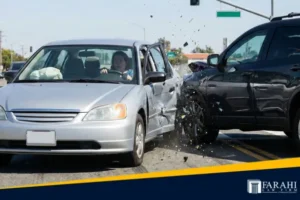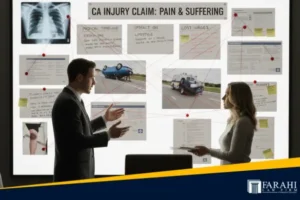Delaying a doctor visit after a car crash—even without visible injuries—could cost you more than you think. If you’ve been in an accident, seeking an early TBI diagnosis isn’t just smart—it could be the deciding factor in your recovery and legal case.
In California, insurance companies often use gaps in treatment or medical documentation against victims. That means the longer you wait, the harder it becomes to prove your injuries. Understanding this process is key to protecting your health and rights.

Let’s explore why time is critical for a potential brain injury.
Why Does Early Diagnosis Matter So Much After a Head Injury?
Every year, thousands of accident victims walk away from collisions only to suffer the effects of a traumatic brain injury days—or even weeks—later. The absence of bruises or open wounds doesn’t mean you’re in the clear. Internal injuries, especially to the brain tissue, can be silent but dangerous.
Data from the National Institutes of Health (NIH) indicates that adults aged 65 and older are the most vulnerable to hospitalization and death from TBI, primarily caused by falls. However, across all age groups, men are nearly three times more likely to die from a TBI than women. For both genders, the risk of long-term damage increases when TBI treatment is delayed.
5 Reasons Early TBI Diagnosis Can Influence Your Case Outcome
1. Insurance Companies Use Delays Against You
Insurance companies scrutinize timelines. If there’s a gap between your accident and medical visit, they may argue your injury wasn’t serious, or wasn’t caused by the accident at all. That puts your personal injury claim at risk.
What they might say:
- “The injury could have happened after the car crash.”
- “No CT scans or magnetic resonance imaging were done right away.”
- “The patient waited too long for emergency care.”
Avoid this by:
- Visiting a medical professional immediately after any head trauma
- Keeping thorough medical records
- Requesting brain imaging, such as CT scans or MRIs, early
2. TBI Symptoms Are Often Delayed or Misunderstood
Many concussion symptoms show up subtly: a lingering headache, fatigue, or trouble concentrating. These danger signs and symptoms might be dismissed as stress without an early TBI diagnosis.
Traumatic brain injuries affect multiple functions—here’s a breakdown of common symptoms by category:
Function Affected | Common Symptoms |
Cognitive Function | Difficulty with memory, impaired judgment, and delayed response time |
Emotional & Behavioral | Irritability, disorientation, impulsive or aggressive behavior |
Physical Movement | Problems with balance, reduced muscle control, difficulty walking |
Sensory Perception | Sensitivity to bright light, changes in hearing, or vision |
Physical Discomfort | Ongoing headaches, fatigue, dizziness, and disrupted sleep patterns |
3. California Law Requires Prompt Action to Support Your Case
In California, the severity of the injury must be proven in your case. Medical evidence helps establish the link between the accident and your injury. If TBI treatment delay becomes a pattern, it weakens your case, especially in motor vehicle accident claims.
Hiring a Hawthorne brain injury lawyer early can ensure your documentation, deadlines, and treatment plan align with legal standards. They’ll also help secure expert opinions on your cognitive impairment or damage to blood vessels, brain trauma, or potential subdural hematoma.
4. Some Injuries Don’t Show Up on CT Scans
Even advanced brain imaging might miss a mild traumatic brain injury or mild TBI. Doctors use the Glasgow Coma Scale and other assessments to determine your status, especially when skull fracture or brain damage isn’t apparent.
That’s why continuous monitoring and follow-up visits matter. If symptoms worsen without early intervention, proving that the head injury was accident-related becomes even more difficult.
5. Your Health Depends on It
Beyond legal implications, your long-term health depends on early detection. Left untreated, even a mild TBI can evolve into lasting brain trauma.
Early TBI diagnosis allows your care team to:
- Reduce swelling and inflammation before it causes more damage
- Prevent secondary complications like seizures or infections
- Customize a treatment plan tailored to your needs
- Improve the chances of full neurological recovery
What Should You Do If You Suspect a Brain Injury?
Here are your next steps immediately after a car accident:
- Seek emergency care even if you feel okay.
- Request CT scans or magnetic resonance imaging to detect internal injuries.
- Watch for delayed signs and symptoms (e.g., nausea, confusion, vision issues).
- Start a journal documenting symptoms, medications, and doctor visits.
- Contact a Hawthorne brain injury lawyer familiar with California’s personal injury laws.
If your accident occurred near spots like Hawthorne Boulevard or Rosecrans Avenue, you’re not alone. Our local legal team understands the traffic patterns, city policies, and common accident zones in Hawthorne, CA, making investigating your case easier and fighting for your rights.
FAQs
A TBI is a disruption in normal brain function caused by a blow, jolt, or bump to the head. It can range from mild to severe.
Immediately. Even if you feel fine, internal injuries like brain trauma may not show symptoms right away.
Yes. Even a mild brain injury can cause long-term issues with memory, mood, or sleep.
It’s a neurological scale used to assess the severity of a TBI based on verbal, motor, and eye-opening responses.
Yes. A brain injury lawyer can help establish a clear medical-legal connection, preserve evidence, and prevent insurance companies from downplaying your injury.
Start Strong with Brain Injury Diagnosis and Legal Help
An early TBI diagnosis isn’t just about getting better—it’s about proving your case, getting the care you need, and protecting your financial future. Whether your injury happened in a fall, car crash, or work-related accident, waiting can cost you everything.
If you or a loved one is experiencing symptoms after a head injury, call us today for a free consultation. Our team in Hawthorne is here to guide you through the medical and legal recovery, because your health and justice matter. Our services are offered on a ‘no win, no fee’ basis.



